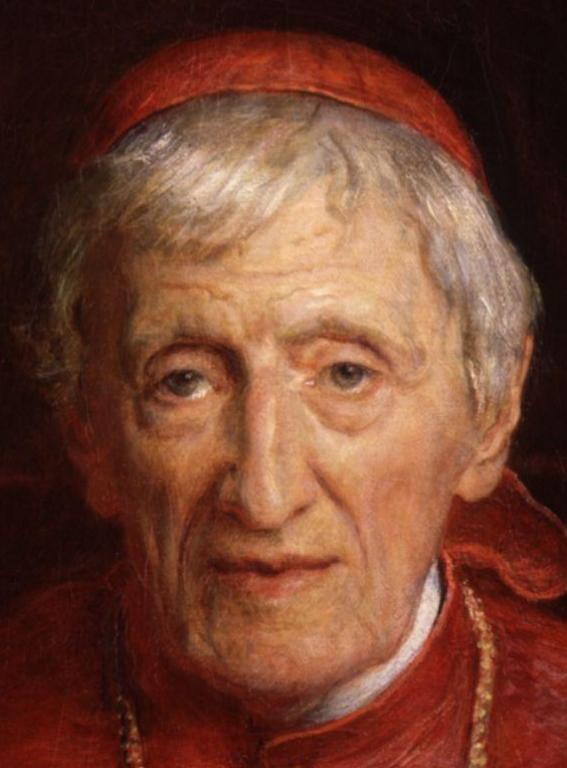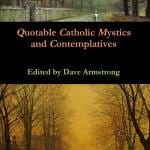
St. John Henry Cardinal Newman (1801-1890)
Newman, while still an Anglican, thirteen years before his conversion, preached a sermon at Oxford University, entitled, “The Reverence Due to the Virgin Mary” (March 25, 1832), which included these words:
Who can estimate the holiness and perfection of her, who was chosen to be the Mother of Christ? If to him that hath, more is given, and holiness and Divine favour go together (and this we are expressly told), what must have been the transcendent purity of her, whom the Creator Spirit condescended to overshadow with His miraculous presence? What must have been her gifts, who was chosen to be the only near earthly relative of the Son of God, the only one whom He was bound by nature to revere and look up to; the one appointed to train and educate Him, to instruct Him day by day, as He grew in wisdom and stature? This contemplation runs to a higher subject, did we dare follow it; for what, think you, was the sanctified state of that human nature, of which God formed His sinless Son; knowing as we do, `that which is born of the flesh is flesh’ (1 Jn 3:6), and that `none can bring a clean thing out of an unclean?’ (Job 14:4). (Parochial and Plain Sermons, San Francisco: Ignatius Press, 1987 [orig. 1843], p. 309)
Later, as a Catholic, St. John Henry Newman wrote, with characteristically brilliant, rhetorical prose, a piece intended as a counter-argument to a hypothetical Protestant objector to the Immaculate Conception:
Does not the objector consider that Eve was created, or born, without original sin? Why does not this shock him? Would he have been inclined to worship Eve in that first estate of hers? Why, then, Mary?
Does he not believe that St. John the Baptist had the grace of God – i.e., was regenerated, even before his birth? What do we believe of Mary, but that grace was given her at a still earlier period? All we say is, that grace was given her from the first moment of her existence.
We do not say that she did not owe her salvation to the death of her Son. Just the contrary, we say that she, of all mere children of Adam, is in the truest sense the fruit and purchase of His Passion. He has done for her more than for anyone else. To others He gives grace and regeneration at a point in their earthly existence; to her, from the very beginning.
We do not make her nature different from others . . . certainly she would have been a frail being, like Eve, without the grace of God . . . It was not her nature which secured her perseverance, but the excess of grace which hindered Nature acting as Nature ever will act. There is no difference in kind between her and us, though an inconceivable difference of degree. She and we are both simply saved by the grace of Christ.
Thus, sincerely speaking, I really do not see what the difficulty is . . . The above statement is no private statement of my own. I never heard of any Catholic who ever had any other view . . .
Consider what I have said. Is it, after all, certainly irrational? Is it certainly against Scripture? Is it certainly against the primitive Fathers? Is it certainly idolatrous? I cannot help smiling as I put the questions . . .
Many, many doctrines are far harder than the Immaculate Conception. The doctrine of Original Sin is indefinitely harder. Mary just has not this difficulty. It is no difficulty to believe that a soul is united to the flesh without original sin; the great mystery is that any, that millions on millions, are born with it. Our teaching about Mary has just one difficulty less than our teaching about the state of mankind generally. (Meditations and Devotions, Harrison, New York: Roman Catholic Books, n.d. [orig. 1893], “Memorandum on the Immaculate Conception,” 151-152, 155-156)
Bishop William Bernard Ullathorne (1806-1889)
It is the divine maternity of Mary which explains both her perfect excellence and her perfect holiness. It is the key to all her gifts and privileges. For the excellence of each creature is to be found in the degree in which it resembles its Creator . . .
Mary was made as like to Him [Christ], as being a mere creature, she could be made. For, having no earthly father, Our Lord bore the human likeness of His mother in all His features. Or rather, she bore His likeness. And as, for thirty years of His life, her mind was the law which directed His obedience, and her will the guide, which regulated His actions, her soul was the perfect reflection of His conduct. And as all created holiness is derived from Jesus, and from the degree of our union with Jesus, of which union His sacred and life-giving flesh is the great instrument; we may understand something of the perfect holiness of the Mother of God, from the perfection of her union with her Son. For He was formed by the Holy Ghost of her flesh. And His blood, that saving blood which redeemed the world, was taken from her heart. And whilst the Godhead dwelt bodily in Him, He, for nine months, dwelt bodily in her. And all that time . . . the stream which nourished the growth of life in Jesus flowed from the heart of Mary, and, at each pulsation, flowed back again, and re-entered His Mother’s heart, enriching her with His divinest spirit. How pregnant is that blood of His with sanctifying grace, one drop of which might have redeemed the world . . . Next to that union by which Jesus is God and man in one person, there is no union so intimate as that of a mother with her child. (The Immaculate Conception of the Mother of God, Westminster, Maryland: Christian Classics, 1988 [orig. 1855], 6-7)
Certainly, He who preserved the three children from being touched by the fire in the midst of which they walked uninjured, and who preserved the bush unconsumed in the midst of a burning flame, could preserve Mary untouched from the burning fuel of concupiscence. He who took up Elijah in the fiery chariot, so that he tasted not of death, could, in the chariot of His ardent love, set Mary on high above the law of sin . . . And He who held back the waves of that Jordan, that the ark of the Old Testament might pass untouched and honoured through its bed, could hold back the wave of Adam, lest it overflow the ark of the New Testament beneath its defiling floods. For that we are born in the crime of Adam and with original sin, is not the result of absolute necessity, but of the divine will. And if He who ordained this penalty, had already solved it in part, when ere His birth, He sanctified the holy Precursor of His Coming; much more could he solve it altogether when He sanctified His holy Mother.
For He, who could have limited Adam’s sin unto himself, can ward off that sin from Mary. And what He could, that He willed to do. For why should He not have willed it? (Ibid., 32-33)
James Cardinal Gibbons (1834-1921)
Whenever God designs any person for some important work, He bestows on that person the graces and dispositions necessary for faithfully discharging it . . .
The Prophet Jeremiah was sanctified from his very birth because he was destined to be the herald of God’s law to the children of Israel: `Before I formed thee in the bowels of thy mother I knew thee, and before thou camest forth out of the womb I sanctified thee.’ (Jer 1:5) . . .
John the Baptist was `filled with the Holy Ghost even from his mother’s womb.’ (Lk 1:15). `He was a burning and a shining light’ (Jn 5:35) because he was chosen to prepare the way of the Lord.
The Apostles received the plenitude of grace; they were endowed with the gift of tongues and other privileges (Acts 2) before they commenced the work of the ministry. Hence St. Paul says: `Our sufficiency is from God, who hath made us fit ministers of the New Testament.’ (2 Cor 3:5-6) [other translations have “able,” “competent,” “qualified,”] . . .
There is none who filled any position so exalted, so sacred, as is the incommunicable office of Mother of Jesus; and there is no one, consequently, that needed so high a degree of holiness as she did.
For, if God thus sanctified His Prophets and Apostles as being destined to be the bearers of the Word of life, how much more sanctified must Mary have been, who was to bear the Lord and `Author of life’ (Acts 3:5) . . . If God said to His Priests of old: `Be ye clean, you that carry the vessels of the Lord’ (Is 3:2); nay, if the vessels themselves used in the divine service and churches are set apart by special consecration, we cannot conceive Mary to have been ever profaned by sin, who was the chosen vessel of election, even the Mother of God. (The Faith of Our Fathers, New York: P. J. Kenedy & Sons, revised edition, 1917, 135-137)
Louis Bouyer (1913-2004)
The case of the Virgin Mary . . . is certainly the one which best reveals the Catholic idea of sanctity, [yet] to Protestants it appears the height of idolatry . . .
If there is any Catholic belief that shows how much the Church believes in the sovereignty of grace, in its most gratuitous form, it is this one. It is remarkable that the Orthodox controversialists, contrary to the Protestants, reproach Catholics for admitting, in this one case of Our Lady, something analogous to what strict Calvinists admit for all the elect — a grace that saves us absolutely independently of us, not only without any merit of our own, but without any possibility of our cooperation, . . . whereas the Protestant view seems, not merely against reason, but completely absurd. To say that Mary is holy, with a super-eminent holiness, in virtue of a divine intervention previous to the first instant of her existence, is to affirm in her case as absolutely as possible that salvation is a grace, and purely a grace, of God. (The Spirit and Forms of Protestantism, translated by A. V. Littledale, London: Harvill Press, 1956, p. 247)
This faith of Mary’s, whereby the free act of fallen man effectively reversed Eve’s choice of unbelief and revolt, presupposes, on the part of God, his total repossession of his creature. For God to give himself as he intended, for his Word to take flesh of Mary, it was necessary that, in Mary, he should take back his creature wholly to himself . . .
Though the Immaculate Conception was the most excellent of all the graces given before Christ, it would be mistaken to look on it as a grace perfect in itself, sufficient in itself . . . It is . . . only the pre-condition of Christian grace; for this begins with Mary’s `fiat’, with the acceptance and the accomplishment of the Incarnation . . .
The whole course of the Old Testament culminates in the Immaculate Virgin. In her the ultimate realities of the New are first foreshadowed . . .
The New and Eternal Testament starts from her . . . She proclaims, prefigures, and realises, in a wholly unique manner, all the sanctity to be attained ultimately by the Church, when it shall have reached its perfection. The Virgin `without spot or wrinkle’ (Eph 5:27), to be presented to Christ at the end of time is the Church; but Mary, at the beginning of the new epoch, is already this Virgin without stain. She is, thus, the promise already fulfilled, the pledge already actualised, of what all of us together are to become . . .
All this goes to show that there is no ground for the Protestant apprehension that the Church’s worship of our Lady is a form of idolatry, for we venerate in her simply the glory promised by God to every creature. In consequence, we are in no danger of ever attributing to her any of that glory which God has said that he will never give to another (Is 42:8, 48:11). (The Seat of Wisdom, translated by A. V. Littledale, Chicago: Henry Regnery Co., 1965 [orig. 1960], 119-120, 126, 128-129)
***
Related Reading:
Blessed Virgin Mary & God’s Special Presence in Scripture [1994; from first draft of A Biblical Defense of Catholicism]
*
*
“Armstrong vs. Geisler” #6: Sinless Mary [3-1-17]
Scripture, Through an Angel, Reveals That Mary Was Sinless [National Catholic Register, 4-30-17]
Armstrong vs. Collins & Walls #3: Necessity of Immaculate Mary? [10-18-17]
Armstrong vs. Collins & Walls #4: Mary “Not a Genuine Human Being”? [10-19-17]
Mary’s Immaculate Conception: Necessary or “Fitting”? [12-8-17]
Amazing Parallels Between Mary and the Ark of the Covenant [National Catholic Register, 2-13-18]
Biblical Support for Mary’s Immaculate Conception [National Catholic Register, 10-29-18]
*
My book royalties from three bestsellers in the field (published in 2003-2007) have been decreasing, as has my overall income, making it increasingly difficult to make ends meet. I provide over 2500 free articles here, for the purpose of your edification and education, and have written 50 books. It’ll literally be a struggle to survive financially until Dec. 2020, when both my wife and I will start receiving Social Security. If you cannot contribute, I ask for your prayers. Thanks! See my information on how to donate (including 100% tax-deductible donations). It’s very simple to contribute to my apostolate via PayPal, if a tax deduction is not needed (my “business name” there is called “Catholic Used Book Service,” from my old bookselling days 17 or so years ago, but send to my email: [email protected]). Another easy way to send and receive money (with a bank account or a mobile phone) is through Zelle. Again, just send to my e-mail address. May God abundantly bless you.
***
(compiled and edited in 1994)
Photo credit: Close-up from an 1881 portrait of St. John Henry Cardinal Newman (1801-1890) by Sir John Everett Millais (1829-1896) [public domain / Wikimedia Commons]
***

















